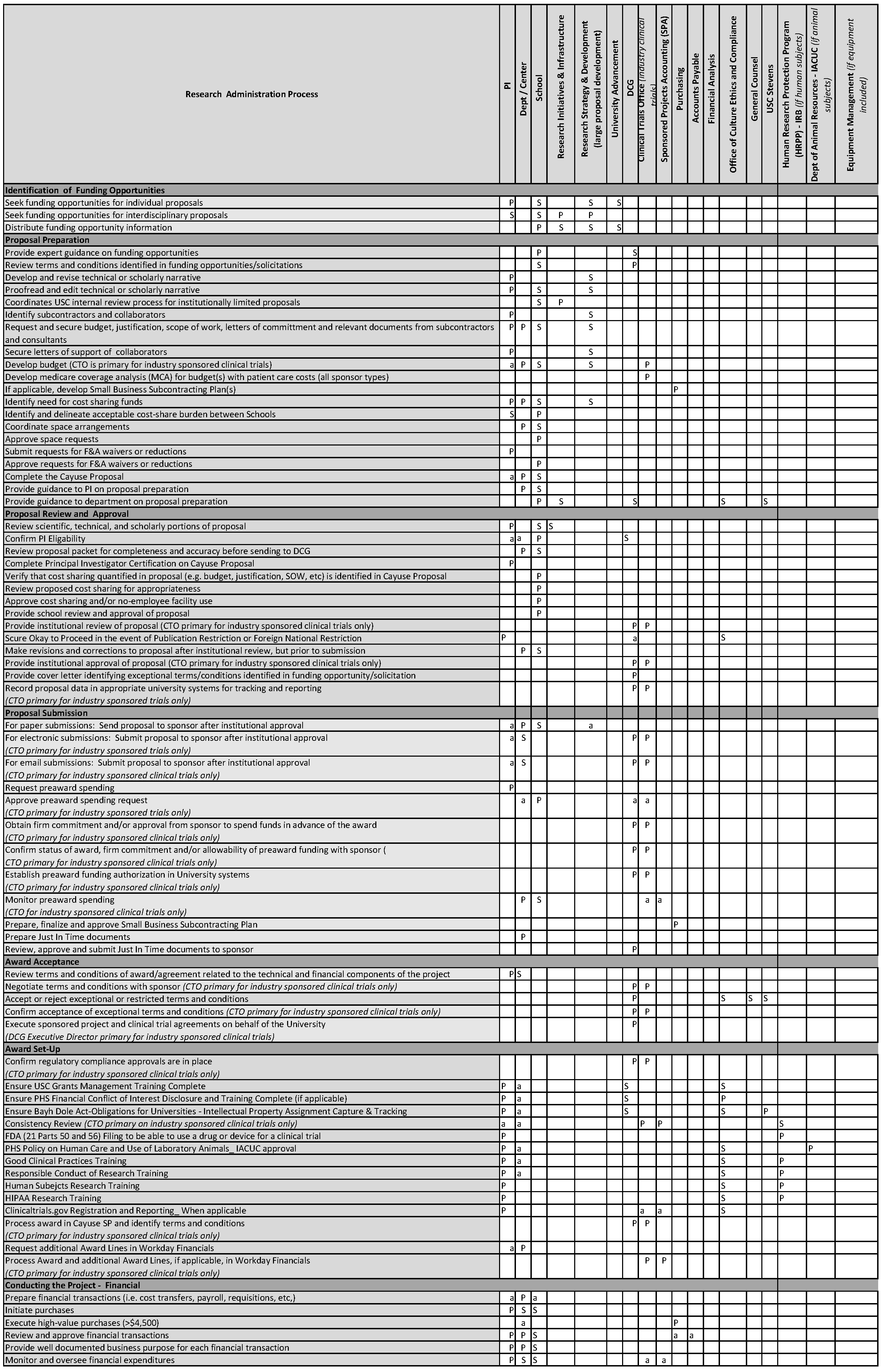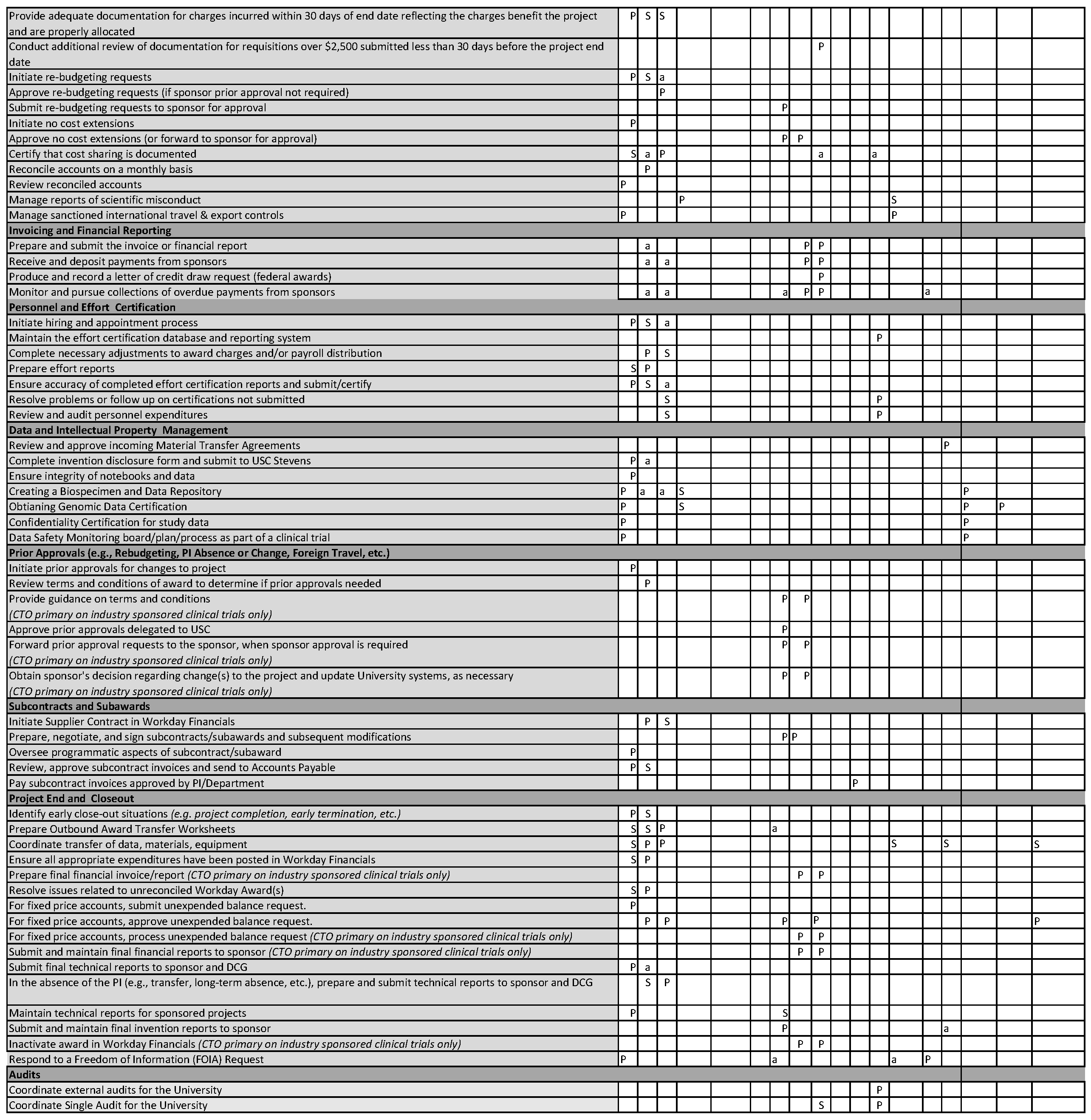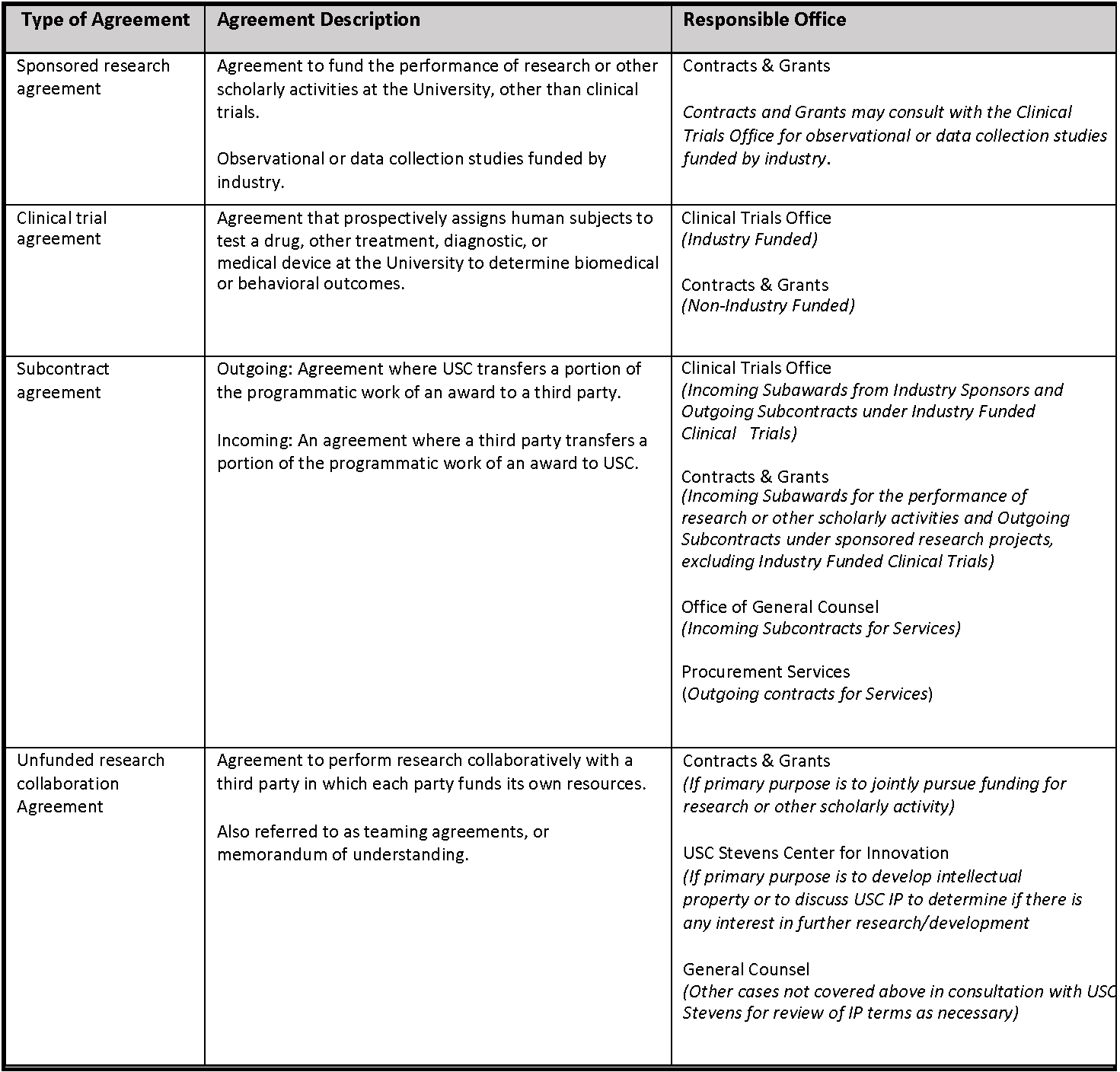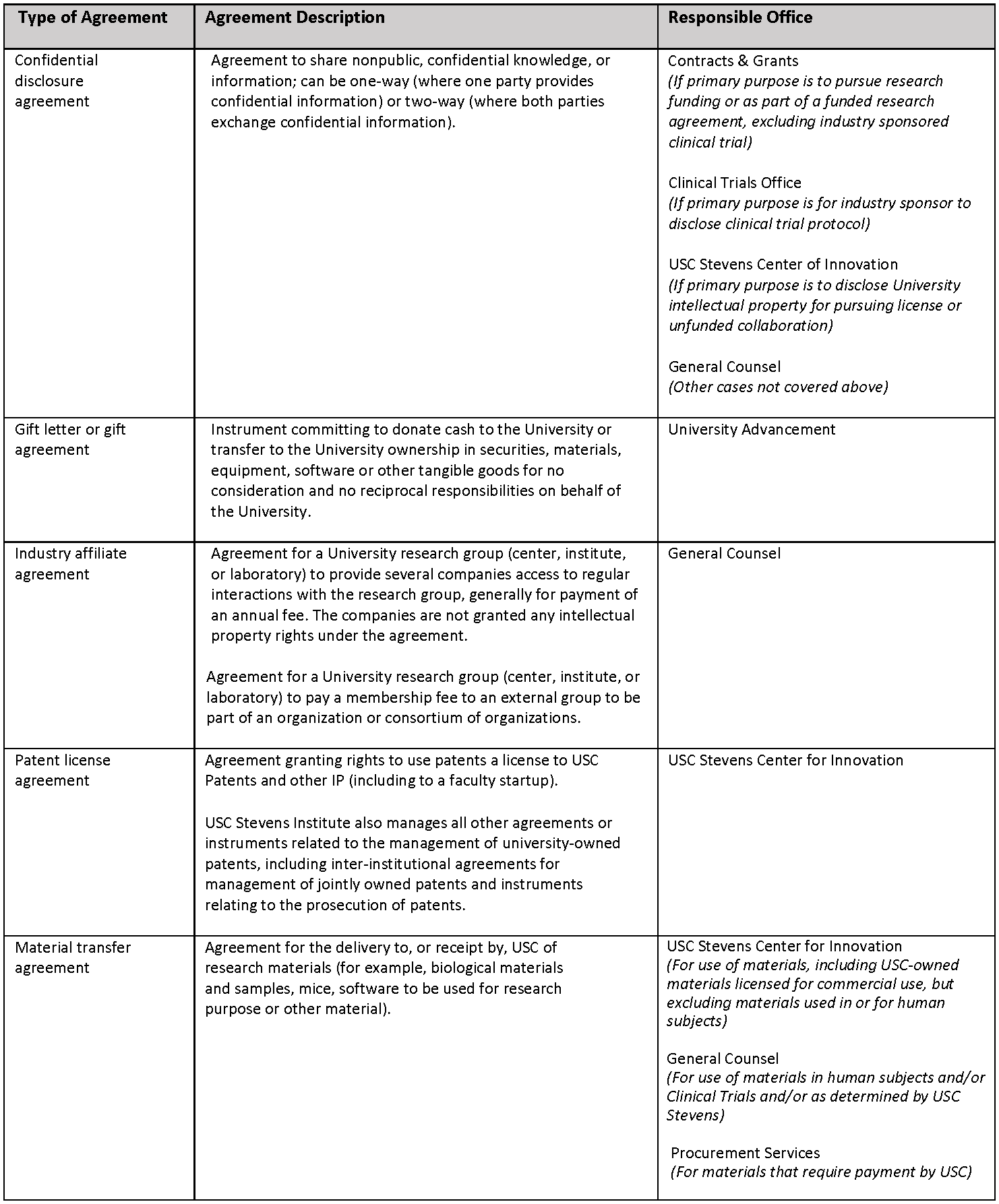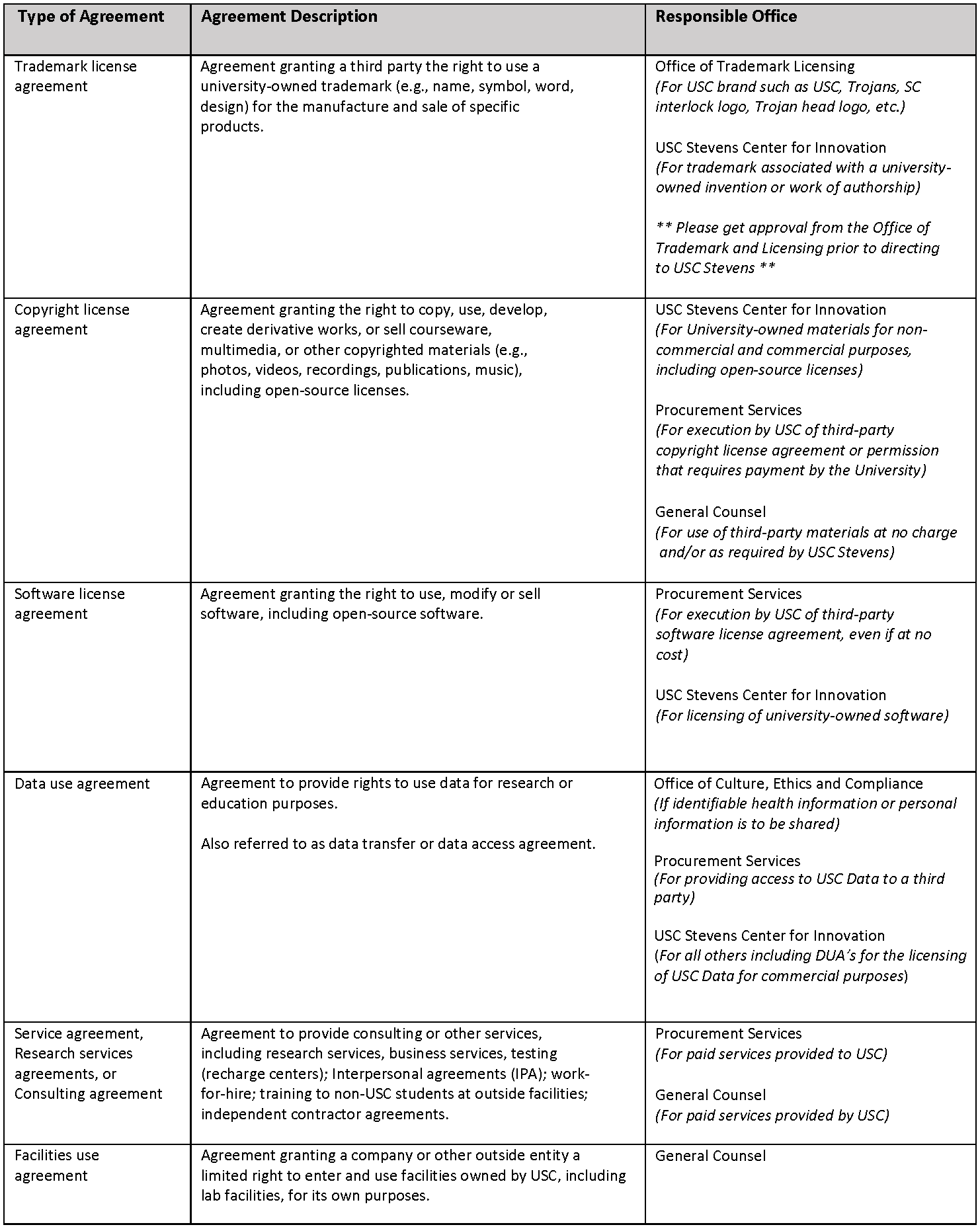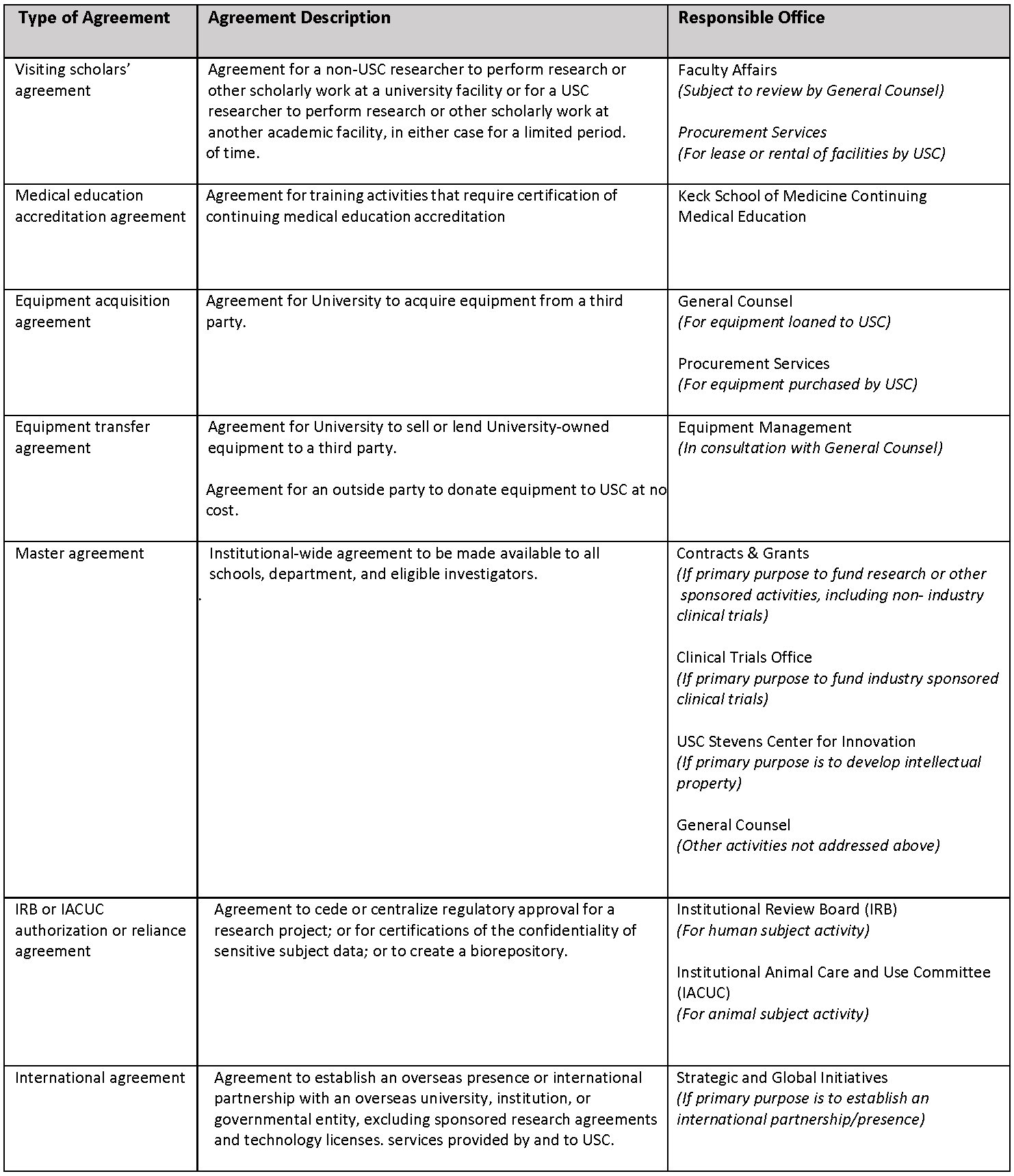In an effort to expand the tools available to our research community, the Department of Contracts & Grants has compiled a list of useful policies, procedures, forms, and resources. This webpage contains useful information aimed at assisting the USC research community regarding both internal and external guidance in all stages of the award lifecycle.
General Guidance
Below are helpful links to USC policies and guides that may be helpful while managing your awards.
Roles and Responsibilities Made Easy
The University of Southern California is committed to helping its faculty secure financial resources in support of their research. Doing this requires a partnership among faculty investigators, schools (and their departments, research centers and institutes), and central administration. The information below describes the roles and responsibilities of each of these groups.
Roles and Responsibilities (By Agreement Type)
USC Offices Responsible for Handling Agreements with External Entities and Other External Collaborators
The following table provides a description of the most common types of agreements entered by the University, as well as the office responsible for handling each type of agreement. The Responsible Office may coordinate with other offices to make the determination of which office is responsible for the type of Agreement.
Agreements may be signed on behalf of the University only by authorized officers of the University with designated signature authority. The Responsible Office may coordinate with other offices in their review of the Agreement Type, however, will be primarily responsible for securing and coordinating any needed reviews, approvals, and signatures. Click here to download PDF.
Please Note: To facilitate the execution of each agreement, please submit the respective agreement to the responsible office using the below as a reference guide. For any questions regarding the type of agreement, please contact Katie Rountree, DCG Executive Director, rountree@usc.edu .
Responsible Office | Submission Method |
Department of Contracts and Grants | Cayuse SP: https://usc.app.cayuse.com/Contacts: https://dcg.usc.edu/contracts-and-grants-directory/ |
Clinical Trials Office | OnCore: https://usc-oncore-prod.forteresearchapps.com/ Contacts: https://clinicaltrials.usc.edu/contact-us/ |
Equipment Management | Josie Amescua amescua@usc.edu |
Faculty Affairs (by School) | School Contacts: https://faculty.usc.edu/new/school-contacts/ |
IRB or IACUC | iStar: https://istar.usc.edu/iStar/sd/PublicCustomLayouts/SSO/Selection |
Keck Continuing Medical Education | Lisa Delgado lisa.ho@med.usc.edu |
Office of Ethics and Compliance | Daniel Abramson dabramso@usc.edu |
Office of General Counsel | Vardan Duzadabanyan vduzdaba@usc.edu |
Strategic and Global Initiatives | Kana Sugita kanay@usc.edu |
Trademarks and Licensing | Trademarks: https://trademarks.usc.edu/home/apply/ trdmarks@usc.edu |
University Advancement | John Yu johnwyu@usc.edu |
USC Stevens | Sophia: https://stevens.usc.edu/researchers/mta-cda/ Contacts: https://stevens.usc.edu/directory/ |
Services Agreements
Click here to access Service Agreements Page
Roles and Responsibilities in Research Administration
Principal Investigator Responsibilities
Principal Investigators play a pivotal role in USC research projects, overseeing their direction, ensuring adherence to ethical standards, and fostering collaboration among team members. Their leadership and expertise are crucial for driving innovation, maintaining research integrity, and ultimately advancing knowledge in their field.
Below is a list of common PI pre-award and post-award responsibilities.
Pre-Award Responsibilities:
- Developing, proofreading, editing, and revising any technical or scholarly narratives.
- Ensuring the proposal is consistent with sponsor guidelines and University policy.
- Identifying subcontractors and collaborators and securing a budget, scope of work and any relevant documents from subcontractors and consultants.
- Identifying the need for any cost sharing funds.
- Obtaining all needed regulatory approvals.
- Ensuring that the proposal record in Cayuse SP is certified and correctly reflects any foreign influences or conflicts of interest.
Post-Award Responsibilities:
- Executing the project as outlined in the funded proposals.
- Carrying out the project’s financial plan as presented in the proposal.
- Making changes to the project’s financial plan following sponsor and/or USC’s policies and procedures.
- Reporting project progress and submitting deliverables to the sponsor as outlined in the terms of award.
- Responding promptly to staff requests for approvals, information, or decisions.
- Ensuring that an accurate record is maintained of project-related expenses.
- Selecting, training, and evaluating project staff and students.
- Complying with all USC policies and procedures, maintaining high standards of research integrity, and protecting the welfare of research subjects.
- Complying with all applicable sponsor rules, regulations and/or terms and conditions of the award.
Although the PI is usually assisted by administrative staff for the creation of budgets, protocols, the Cayuse SP proposal record, and the management of project funds, the ultimate responsibility for the financial and administrative management of the project rests with the PI.
Department/Center Research Administrator Responsibilities
Departmental Research Administrators are responsible for managing the administrative aspects of research projects, ensuring compliance with funding regulations, and facilitating smooth communication between researchers and funding agencies. Below is a list of common departmental research administrator pre-award and post-award responsibilities.
Pre-Award Responsibilities:
- Review proposals for completeness and accuracy before submission.
- Complete and route Cayuse SP proposal records for review and approval.
- Assist with budget development and proposal preparation/revisions.
1. Identify any cost-share needs.
2. Coordinate any space.
3. Prepare and upload just-in-time.
4. Monitor any pre-award spending.
5. Secure a budget, scope of work and any other relevant documents from subcontractors and consultants.
Post-Award Responsibilities:
- Prepare budgets (including any satellite budgets), financial transactions (e.g., cost transfers, payroll, requisitions) and certify that cost sharing is documented.
- Review and approve financial transactions.
- Complete necessary adjustments to award charges and/or payroll.
- Review the terms and conditions of the award to determine if any prior approvals are needed and notify DCG if /when prior approvals are requested.
- Prepare effort.
- Initiate supplier contracts and change orders in Workday and ensure all requested information is complete.
School Responsibilities
Schools are responsible for ensuring that administrative support is provided to investigators for the preparation of budgets, forms and support in the fiscal and administrative management of sponsored projects. In some schools, this support is provided centrally by the school as a service for all of the school’s PIs. In other schools, departments, centers, and/or institutes provide this service locally.
It is the school’s responsibility to ensure that no PI is left without administrative support, that all PIs are aware of where to obtain support, and that sufficient resources are available to meet the needs of PIs.
Below is a list of common school-level pre-award and post-award responsibilities.
Pre-Award Responsibilities:
- Provide expert guidance on funding opportunities.
- Identify and delineate acceptable cost-share burden between schools.
- Approve requests for space.
- Approve requests for indirect cost waivers or reductions.
- Guide departments on proposal preparations.
- Verify that any cost sharing quantified in the proposal is reported in Cayuse SP.
- Review proposed cost sharing for appropriateness.
- Approve cost sharing.
- Confirm the eligibility of a PI.
- Confirm that the scope of work is in keeping with the mission of the school.
- Confirm that the school has the space and resources to support the proposed work.
- Confirm that the budget is reasonable and in keeping with University policy.
- Provide school review and approval of proposals.
Post-Award Responsibilities:
- Approve re-budgeting requests.
- Certify that cost sharing is documented.
- In the absence of the PI (e.g., transfer, long-term absence) prepare and submit technical reports to the sponsor and DCG.
Department of Contracts and Grants
The Department of Contracts and Grants (DCG) supports USC’s investigators from proposal development to award closeout, ensuring that sponsored projects are consistent with university standards for academic freedom, research ethics and fiscal responsibility. In light of these obligations, DCG has a Service Commitment that covers the services provided by the department, including:
- Proposal Review Services
- Negotiation of Sponsored Research Agreements
- Cayuse SP Guidance
- Training for Faculty and Staff
Central Administration Offices
Central Administration serves as the backbone for many of the research endeavors at USC, providing essential support services and regulatory compliance oversight.
- Research Integrity and Ethics with respect to protecting animal and human subjects, managing conflicts of interest, preventing scientific misconduct, and ensuring safety.
- Academic Principles, ensuring that academic freedom is protected, students are not restricted from participation in research, work can be independently and openly disseminated, and work is not designed to serve an overtly proprietary purpose (such as product endorsement or advertising).
- Fiscal Responsibility, ensuring that the university is capable of meeting contractual obligations and that agreements do not expose USC to unwarranted risk or liability. Central administration’s responsibilities include negotiating agreement terms, billing and financial reporting to sponsors, and payments to vendors and employees.
Below is a list of various offices at USC that play a vital role in supporting the university’s research mission. Each office has its own unique set of responsibilities, but they all work together to create a supportive environment for both researchers and their support staff.
- The Department of Contracts and Grants is responsible for proposal submission, award negotiation, sub-awards, award set-up and close-out, and ensures that grants and contracts are consistent with university standards for academic freedom, research ethics and fiscal responsibility.
- Sponsored Projects Accounting oversees the post-award financial administration of sponsored research for the university, including the submission of financial reports and invoicing.
- The Office of Financial Analysis supports the University’s research activities by managing federal rate agreements, audits, and compliance reporting. It oversees recharge centers, effort certification, and cost exceptions, while providing training and analysis to ensure regulatory compliance and financial integrity.
- The Office of Research Strategy and Development offers assistance in pursuing competitive federal funding opportunities with a targeted focus on large, multidisciplinary research endeavors.
- The Department of Disbursement Control & Accounts Payable is responsible for processing and distributing payments to subcontractors.
- The Department of Purchasing Services is responsible for processing reimbursements, Independent Consultant Agreements, and issuing Purchasing Orders for subcontracts.
- The Clinical Trials Office specializes in industry-sponsored clinical trials.
- The Office of Ethics and Compliance handles export restrictions, conflict of interest disclosures, and research compliance education.
- The Office of General Counsel is responsible for addressing legal issues arising out of the activities of USC, Keck Medicine of USC, and various subsidiary entities.
- The USC Stevens Center for Innovation handles the licensing of intellectual property, material transfer agreements, confidential disclosure agreements and assistance with start-ups.
- University Advancement specializes in gift agreements (i.e., an agreement where an organization or individual asks for no work product, intellectual property or any other item of value in exchange for funding).
- Risk Management and Insurance – The Office of Risk Management & Insurance protects the physical, financial, human, and reputational assets of the university. We focus on understanding and managing risks associated with these assets. In addition, university risk is transferred through the purchase of insurance and the management of self-insurance programs.
- Human Research Protection Program – The HRPP in partnership with the research community, is responsible for ensuring the safety and welfare of participants in Human Subjects Research conducted under the aegis of USC. HRPP, which is a Division within the Office of Research and Innovation, provides the campus and the four USC Institutional Review Boards (IRBs) with professional guidance and administrative support and oversight.
- Institutional animal care and use committee (IACUC) – Oversees USC’s animal programs, animal facilities, and policies ensuring appropriate care, ethical use and humane treatment of animals
USC Policies and Training Programs
The below USC policies and training programs created with the goal of protecting the safety and well-being of research participants, ensuring the integrity of research data, promoting responsible financial management of research funds, protecting the university’s intellectual property, and ensuring that all research is conducted in a safe and ethical manner.
Common Forms & Templates
Below are links to standardized documents, forms, and templates that users can easily locate, download, as needed.
Sponsor Resources for Research Administrators
Below is a list of sponsor resources for some of our most common sponsors at USC. They include proposal and award guidance, information on submission methods and processes, as well as general policies and procedures for each sponsoring entity.
